FIFA Defends Islamic Republic’s Presence In World Cup
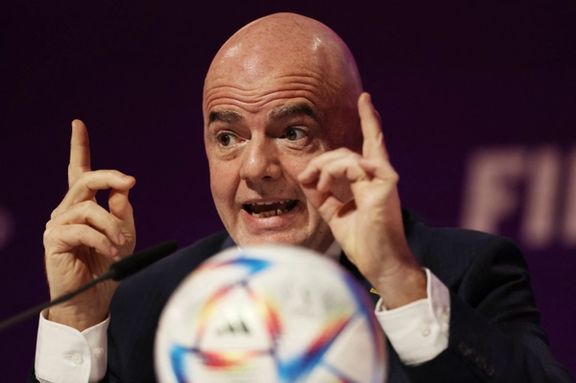
FIFA president Gianni Infantino has defended the presence of the Iranian national soccer team at the World Cup in Qatar despite calls for dropping the team over the crackdown on protests.

FIFA president Gianni Infantino has defended the presence of the Iranian national soccer team at the World Cup in Qatar despite calls for dropping the team over the crackdown on protests.
During a news conference on the eve of the start of the tournament on Saturday, Infantino said, "It's not two regimes playing against each other, it's not two ideologies playing against each other, it's two football teams” implying that the crimes of governments should not stop teams from competing.
"If we don't have at least football to bring us together... which world are we going to live in? In Iran there are 80 million people, are they all bad? Are they all monsters?" he said.
“Do we want to continue to spit on the others because they look different, or they feel different? We defend human rights. We do it our way. We obtain results. We got women fans in Iran. The Women’s League was created in Sudan. Let’s celebrate. Don’t divide,” Infantino said as an apparent – but incoherent attempt – to defend hosting the World Cup by Qatar.
For nearly a decade, Russia and Qatar have been suspected of buying votes to win hosting rights for the 2018 and 2022 World Cups.
He also rounded on European critics of the host nation over the issues of migrant workers and LGBT rights.
On Friday, German Football Association (DFB) chief Bernd Neuendorf said the country decided not to back Infantino's re-election next year over the soccer' body's handling of human rights issues at World Cup hosts Qatar and its failure to take a stand on Iran.
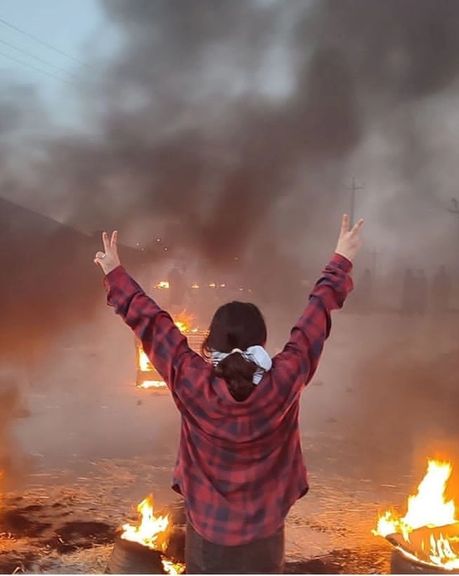
Protests against the Islamic Republic continued in Iran and many cities around the world Saturday to honor protesters killed across Iran and to condemn the regime.
The third month of the protests started with demonstrations and sit-ins at universities in the morning, as workers of the country's largest car parts manufacturer joined the nationwide strikes and clashes were reported during funerals and mourning ceremonies for those who were killed in recent days.
According to reports, security forces attacked the dormitory of medical students in Esfahan early Saturday morning and arrested several students. The raid was carried out hours after professors of the three universities of Esfahan, Shiraz and Tehran’s Beheshti issued separate letters demanding an end to the attacks inside universities and student dormitories.
In addition to universities, staff at many schools across the country are set for strikes on Sunday and Monday upon a call by the Coordination Council of Iranian Teachers' Trade Associations in reaction to the schoolchildren killed in the past few days.
Since the protests began in mid-September following the death in custody of 22-year-old Mahsa Amini, the Islamic Republic has killed more than 400 people, including about 50 children. The number of deaths, which many believe is much higher, has been increasing exponentially ever since protesters became angrier with the regime and crackdown intensified this week.
As a traditional society that holds the departed in high esteem, Iranian people hold a funeral service, and several mourning ceremonies for the third, seventh and 40th day after the death of every single protester, with each event becoming a call for more protests. Security forces attack the gatherings and kill more people; therefore, the cycle goes on ad infinitum.
On Saturday, security forces attacked several mourning ceremonies, including the ones in Tehran, Mahabad, and Shiraz, where people were chanting antigovernment slogans and threatening the regime with continuing the rallies until it falls.
November 19 was also the date for another one of the global rallies that have become one of the recurring phenomena of the current protests. Iranian expatriate communities gather in central parts of their cities from Australia to north America to support the protests in Iran and condemn the Islamic Republic. The rallies are mainly organized by Canada-based activist Hamed Esmaeilion, whose daughter and wife were killed when the IRGC shot down a passenger plane in January 2020. All rallies follow the same motto: The Time Has Come.
Large rallies were held in many cities in the eastern hemisphere, such as Melbourne, Sydney and Wellington while the demonstrations got underway in some European cities. It is estimated that rallies will be held in over 100 cities by the end of Saturday in the western hemisphere.
While the Islamic Republic has been trying to downplay the ongoing strikes in different sectors and industries, every week workers at more companies are joining the movement, both in solidarity with the antigovernment rallies and in protest to the dire economic situation.
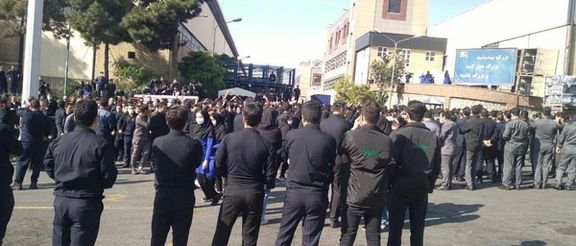
The workers of the Crouse Company, Iran’s largest automobile parts designer and manufacturer, went on strike on Saturday. The company is the backbone of the main carmakers of Iran, which are among the biggest sources of income for the regime.
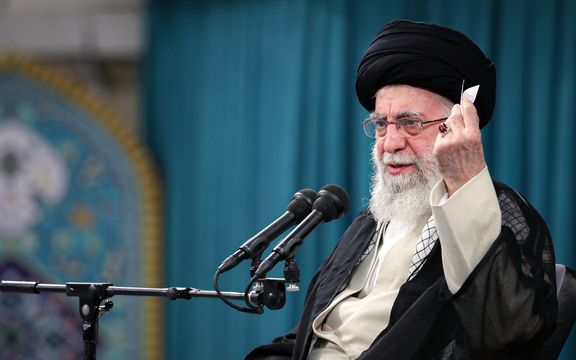
While Iran has been witnessing nationwide protests for over two months, Supreme Leader Ali Khamenei says the organizers of “riots” failed to mobilize the people.
The authoritarian ruler claimed Saturday that the “riots” will come to an end, saying that the protesters “are too inferior to be able to harm the establishment.”
In a speech during a meeting with a group of people from the central city of Esfahan, Khamenei said “now that the organizers failed to bring the people to the scene, they want to tire the officials, but they are wrong because these mischiefs make the people hate them more.”
Khamenei’s strange denial of reality of the nationwide uprising and his unfounded accusations are manifestations of his usual tactic of blaming others and refusing to take responsibility. While he endorsed the 2015 nuclear accord with world powers, he immediately condemned it as soon as former US president Donald Trump withdrew from the deal.
While over 400 people have been killed by regime’s security forces since the start of the uprising, Khamenei failed to utter a single word about the victims, but said “rioters” have killed government forces, which he claimed will anger the nation.
Trying to link the popular protests to attempts to undermine the religious beliefs of the people he stated, “Enmity with all the wishes and sanctities of the Iranian nation means enmity with Islam.”
“Burning the holy Quran, setting fire to mosques, torching the national flag and disrespecting the national anthem revealed the real identity of the perpetrators,” he added.

Officials have been making similar unfounded claims about protesters burning mosques or the Quran, although many do reject the Islamic Republic’s flag and anthem.
Khamenei’s remark about the national anthem referred to athletes refusing to sing the Islamic Republic’s anthem during matches following the death of Mahsa Amini, the young woman whose killing in police custody triggered the unrest.
Many athletes have expressed solidarity with the people either in bold public statements or through different forms of disobedience.
Authorities have made serious threats against athletes and other celebrities to stop them from public displays of solidarity with protesters, but many have defied the warnings.
Stressing that those “deceived” must be differentiated from those “perpetrating” the protests, Iran’s ruler went on to say that “the perpetrators of crimes, murders, and those who threatened to set fire to shops and cars should be punished accordingly.”
“Of course, the punishment should be meted out by a strong, healthy and motivated judiciary, and no one has the right to punish arbitrarily and at will,” he added. However, the Judiciary Khamenei referred to is only accountable to him and disregards due process of law during trials of dissidents.
Khamenei’s call for punishing demonstrators comes as thousands have been arrested in the last two months, with some being at risk of receiving the death sentence for security-related charges, such as “enmity against God and corruption on earth” in sham trials at Revolutionary Courts.
While Iran has been in economic crisis for more than a decade, Khamenei again blamed the protests on “enemies” who cannot see the Islamic Republic’s “progress.”
However, in part of his comments, he also blamed the current situation on officials who did not pay attention to his advice for resolving economic vows.
Khamenei’s advice has been isolation and self-reliance instead of resolving foreign policy issues and improving ties with the West.
“From an economic point of view, the past decade was not a good one and if they [officials] had followed those recommendations and taken the necessary measures, the situation of the country and people would have been different,” he claimed.
This remark was also a misleading statement, as Khamenei alone is responsible for pushing on with Iran’s nuclear program that has brought on sanctions, harming the economy for more than a decade.
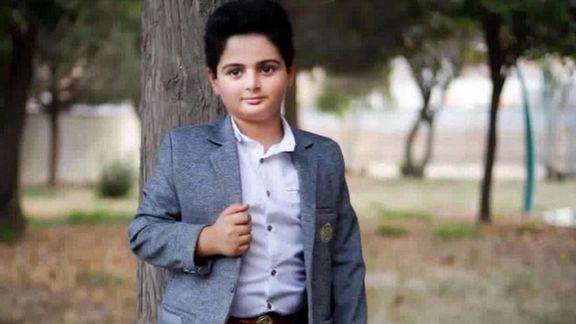
The mother of ten-year-old Kian Pirfalak killed by security forces in Iran was forced to deny she accused the Supreme Leader of responsibility in her son’s death.
Kian’s mother, Zaynab Molaei-Rad made a fiery speech at her son’s burial Friday. There is a video of her reciting a nursery song the words of which she changed to convey a strong message of protest against Supreme Leader Ali Khamenei who she seemed to hold directly responsible for her son’s killing.
“How’s Mister Seyyed Ali [Khamenei] doing? He has a long beard coming down to his chest, a chest full of hatred. His heart is like stone, all he says is nonsense!” she sang in a voice hoarse from crying to a massive crowd who attended the funeral.
The Khuzestan channel of the IRIB aired a video of her Friday night in which she appeared to deny the authenticity of her posts on Instagram and her account of her son’s death.
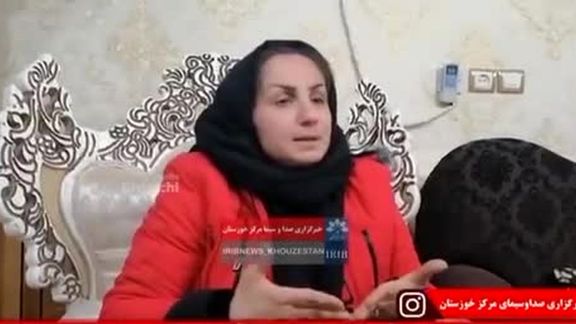
In the video, Kian’s mother who looks deeply distressed is wearing a red coat, very unconventional for a mother who has lost her beloved son. “Please don’t misinterpret my remarks … My child was martyred … I didn’t recite anything … Don’t use my son’s death for your own ends,” she says in the video.
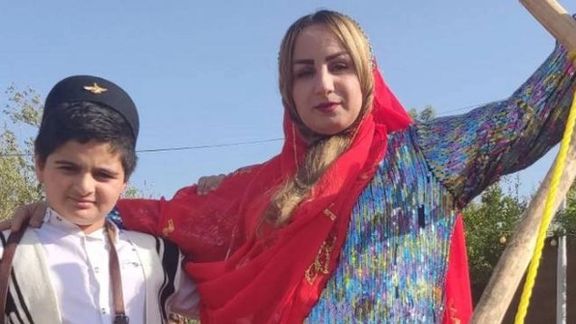
Interviews such as this in which victims or their families repeat authorities’ claims under duress are generally referred to as “coerced confessions” in Iran. Social media users who support the protesters have boycotted sharing the interview made under duress.
The family car carrying Kian, his parents, and three-year-old brother Radin was targeted by plainclothesmen in Izeh, a town of around 100,000 in the east of the oil-rich Khuzestan Province. Kian’s father was also seriously wounded in the shooting and is still in hospital. Authorities claim the family car was attacked by “terrorists”.
A former lawmaker from Izeh, Hojjatollah Darvishpour, has confirmed the account Kian’s mother gave at the funeral and said she has provided all the details about those who shot and moved her son and husband to the Red Crescent and then hospital.
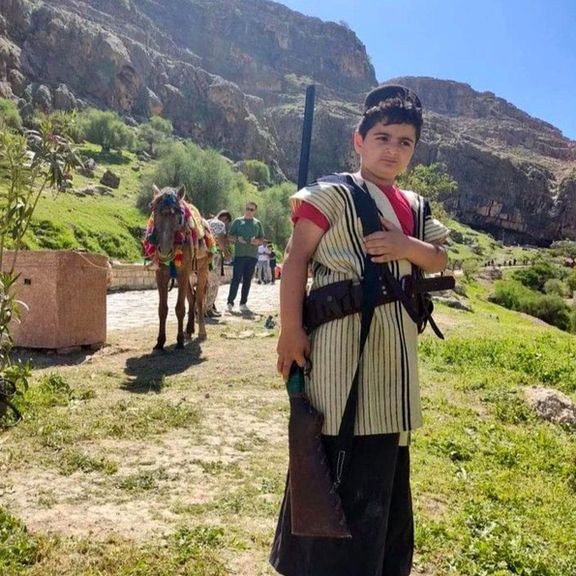
Darvishpour told the state broadcaster (IRIB) Saturday that Basij militia and other security forces were stationed at the Red Crescent at the time of the incident. He also said the fatal shootings in Izeh that claimed seven lives occurred in various places, not in one place by two unidentified motorcyclists as authorities have claimed.
Speaking to Etemad newspaper, Sajjad Pirfalak, Kian’s uncle, has also confirmed Mrs. Molaei-Rad’s account of the shooting and said the family had to hold on to the body at a relative’s house because they did not want it to be “stolen” by authorities like the bodies of other victims.
There are many reports of authorities not handing over bodies of protesters to their families, claiming they were “martyred by terrorists”, and using the bodies in state-sponsored funerals meant for propaganda.
Ahead of World Children’s Day (November 20), the United Nation’s children’s charity, UNICEF, said in a statement that it remains “deeply concerned” by reports of children being killed, injured, and detained in Iran.
UNICEF said despite lack of official data, an estimated 50 children have reportedly lost their lives since late September. “The latest of such horrible losses was 10-year-old Kiyan [Kian] who was shot dead while in the car with his family. This is terrifying and must stop.”
Popular Iranian actress Mahtab Karamati in an Instagram post earlier this week said she was resigning from being UNICEF’s goodwill ambassador, apparently in protest to the organization’s silence about government violence against children in Iran in the past two months.
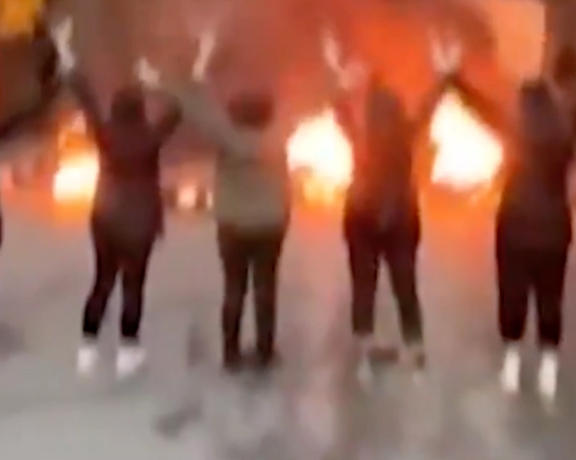
Amid intense protests this week in Iran, the number of people killed by security forces during the protest movement since mid-September has risen to 402.
The US-based Human Rights Activists News Agency (HRANA) announced in its latest report that from September 16 until Friday, November 18, at least 402 protestors have been killed, of which at least 58 were minors.
While the Islamic Republic has not provided accurate figures of those detained in the recent protests, the watchdog went on to say that at least 16,813 protesters have been arrested including 524 students.
Among the detainees are dozens of journalists, artists, filmmakers and other public figures.
Almost 150 Iranian cities have been the scene of anti-government demonstrations, it underlined.
This report also states that at least 140 universities have been the scene of student protests during this period.
In its previous report on Thursday, the group put the number at 381, showing that at least 21 people were killed just in 24 hours.
The Oslo-based Iran Human Rights Organization said on Wednesday at least 342 people including 43 children and 26 women have been killed by security forces in the ongoing nationwide protests.
Protesters have been killed in 23 provinces, with the most reported in Sistan and Baluchestan, Tehran, Mazandaran, Kordestan and Gilan respectively, says IHR.
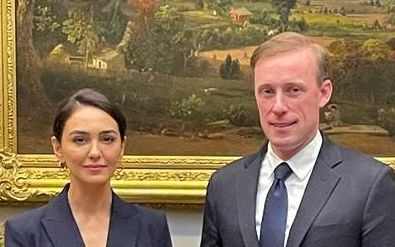
The United States Friday voiced solidarity with Iranian protesters and sympathy for victims killed by security forces, vowing consequences for Tehran’s abuses.
National security adviser Jake Sullivan tweeted about Kian Pirfalak, a nine-year-old boy shot dead when security forces opened fire at his family car in the street earlier this week.
“My thoughts are with Kian’s family,” he wrote and added, “At only 9 years old, Kian was killed after Iranian security forces sprayed his family car with bullets. We will continue to pursue accountability for the senseless death of Kian and so many other courageous Iranians.”
A Twitter user replied to Sullivan that these security forces belong to the Islamic Republic and are not Iranian. Hundreds of other comments demanded more action than words from the United States, some saying that Tehran’s rulers should be further isolated, and others demanded a formal end to nuclear negotiations.
State Department deputy spokesperson Vendant Patel on Friday also spoke about the protests in a briefing to reporters, highlighting that demonstrations this week are in memory of hundreds of people who were killed by government forces in November 2019 in similar circumstances.
“Even today, family members of November 2019 protestors are being arrested, detained, and intimidated for publicly demanding justice for their deceased relatives. The United States remembers the “Bloody November” and we mourn the loss of Iran’s innocent peaceful protestors,” Patel said. He went on to say that the Islamic Republic disregards the lives of its citizens, especially women.
“Iranian authorities aim to stop dissent and stop the world from watching its brutal crackdown and to prevent the world from taking note of its state-sponsored violence against women,” the spokesperson underlined, pledging to hold Tehran accountable. “We continue to pursue unilateral action, multilateral measures, and UN mechanisms to hold Iranian authorities accountable for this flagrant denial of the Iranian people’s human rights and fundamental freedoms.”
The Biden Administration has frozen nuclear talks with the Islamic Republic, which it pursued for 18 months until August, because of what it says is Iran’s unacceptable demands outside the confines of the nuclear issue. The main hurdle appears to be some sanctions imposed by the previous administration for non-nuclear reasons, including support for terrorism, Tehran’s missile program and human rights violations.
The current round of protests, triggered by the death of Mahsa Amini by Islamic Republic’s ‘hijab police’, have toughened Western attitudes toward Iran’s clerical regime. The fact that the unrest began because of oppression against women finally exposed gross Tehran’s gross violations of human rights.
Some Democrats in Congress have also voiced support for the protests, in addition to vociferous Republican opposition to the Iranian regime. One of this strong voices is Senator Robert Menendez of New Jersey, who is opposed to the 2015 nuclear accord known as the JCPOA and demands a tougher position against Tehran.
As the administration issued multiple new sanctions this week on foreign individuals and companies violating Iran sanctions, 14 Democrats on the House Foreign Affairs Committee demanded greater “pressure on the [Iranian] regime” and “justice and accountability for the brave Iranians who already lost their lives at the hands of state authorities…”
Among the signatories were Joaquin Castro, Ted Lieu, Ilhan Omar, Brad Schneider, and Susan Wild. Lieu, who opposed the JCPOA in 2015, said the US should “impose immediately all sanctions that are still available on Iran.”